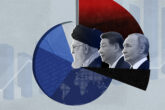November 30, 2022
How the Price Cap on Russian Oil Will Work in Practice
The price cap on Russian oil is a policy backed by the G7 designed to curb Moscow’s oil revenues. Since Russia launched its invasion of Ukraine in February, the G7 has imposed a wide array of sanctions on Russia, freezing hundreds of billions of dollars in assets held by the Central Bank of Russia, severing many of the country’s largest banks from the global financial system, and cutting technology exports to its military-industrial complex. The sanctions have been impactful, throwing the Russian economy into a steep recession—the IMF projects Russia’s economy will contract 3.4 percent this year.
The United States will play the central role in the price cap. In some instances, that’s because global banks that rely on the US financial system will serve as intermediaries in transactions for Russian oil.
The price cap will change that. While the policy has often been described by some as a “buyers’ cartel,” that’s not quite right. The United States imposed an embargo on Russian oil imports back in March, and the rest of the G7 will largely end oil purchases from Russia by December 5. It would be impossible for the G7 to form a “buyers’ cartel” when they’re buying hardly any Russian oil.
Read the full article from Columbia SIPA.
More from CNAS
-
“Chokepoints” with Edward Fishman
Emily and Geoff are joined by Eddie Fishman to discuss his new best-selling book Chokepoints, on how America has weaponized the global economy. They share economic war stories...
By Emily Kilcrease, Geoffrey Gertz & Edward Fishman
-
Sanctions by the Numbers: 2024 Year in Review
Washington’s economic statecraft has expanded in recent years, largely in response to Russia’s war in Ukraine, competition with the People’s Republic of China...
By Eleanor Hume & Kyle Rutter
-
China’s Next Move: How the U.S. Is Losing the Economic War & What Comes Next | Edward Fishman PT 1
Edward Fishman, an adjunct senior fellow at the Center for a New American Security (CNAS), brings a wealth of knowledge about global economics, sanctions, and the intricate ba...
By Edward Fishman
-
Ziemba on Ukraine Peace Talks, Sanctions & OPEC
Rachel Ziemba, an adjunct senior fellow at the Center for a New American Security (CNAS) speaks with Bloomberg TV’s Joumanna Bercetche on Horizons Middle East and Africa about...
By Rachel Ziemba




